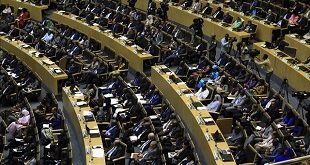
By kabona esiara
Projects worth Rwf 219 billion registered
The experts are busy. Some are attending to clients trickling at intervals, while others are scrutinizing a pile of documents submitted by people seeking construction permits. These architects, engineers, surveyors and environmentalists who used to be scattered in different parts of Kigali, are now assembled at Nyarugenge District Hall where they are under one roof to handle ‘big’ developers.

The team issues permits for all buildings of two levels and above, sites where 100 people are to be accommodated. The team is also charged with handling sites of 1000 meters squared.
The smaller ones, especially residential houses and commercial buildings are now handled by Nyarugenge, Kicukiro and Gasabo districts.
This, according to Emmanuel Nyamurangwa, the Administrator at Kigali City Construction One Stop Centre, has reduced the backlog of files that had accumulated at districts.
Figures from the one stop centre show that on average seven construction permits are issued monthly, three times more than the previous two permits the Kigali Construction Review Commission used to issue per month.
And in the six months of operation, Nyamurangwa, says at least 195 projects have been received, 30 have been approved, 41 construction permits have been issued, seven projects are pending and four are yet to be analyzed.
In total, the Kigali Construction One Stop Centre has registered projects worth about Rwf219 billion. Projects worth Rwf193 billion are ongoing, while projects valued at Rwf26 billion are yet to take off.
All the progress has been made since April 15, 2010, when the centre opened, to October 26, 2010.
The speedy nature of issuing the permits has been applauded by both the politician and private sector.
‘Time for acquiring construction permits has reduced to 30 days and even less,’ says Dr Aisa Kirabo Kacyira, Mayor of Kigali City Council.
‘The speedy handling of developers will help us transform Kigali into a modern planned city in a short time,’ the mayor adds. She promises to reduce the time further with more capacity to handle construction related issues.
Paul Mubirigi, chairman of the Rwanda constructors association concurs with the mayor saying the centre is timely. However, he wants the services extended to other upcountry towns.
‘The initiative is good,’ Mubirigi commended. ‘But I am not sure provinces outside Kigali are benefiting. Upcountry districts too, need the services of one stop construction centre,’ he said in a phone interview. However, the demand for construction permits in some upcountry provinces may not warrant one stop centers.
In Kigali, the one-stop centre comes in place after complaints from real estate developers that there were delays in processing documents by district officials.
The unacceptable delays slowed construction projects in the city to take off. In protest, it is reported some investors would withdraw injecting their money in real estate slowing the economic growth and investments.
The neglect to address the timely delivery of construction permits is partly responsible for the current shortage of both commercial and residential housing units in Kigali. It is estimated the gap in housing units still stagers at 25,000 annually in Kigali but this also provides opportunities for the private sector to invest in properties.
The shortage of commercial space in Kigali, where there is an estimated population of one million people, has pushed the prices to an all-time high.
A property agent in Kigali says renting office space at Centenary House and City Plaza is at US$14 per square meter partly because there is shortage of office space, while renting a residential house in Nyarutarama and Gaculiro costs US$2500 monthly.
However, the land landmark reform made possible by Prime Ministerial order legalizing and enforcing time limits for the delivery of construction permits is hoped will bring prices of properties to affordable levels.
The order also puts calls for sanctions for failure to deliver. According to Frank Twagira, of Rwanda Development Board (RDB), Doing Business Task Force, ‘this will reduce the administrative burden and costs of compliance of acquiring licenses.’
The development also encourages investment in the construction sector that is a key source of growth to the economy. Furthermore, Twagira says, it will improve safety in the sector as businesses will no longer have an incentive to cut corners which is a norm with bureaucratic and time consuming procedures.
These reforms are part of the wider efforts to promote Rwanda as a business and investment destination, in order to drive the growth of the private sector and generate wealth.
‘A good business environment makes it easier for investors to choose Rwanda as their investment location. The easier it is the most likely investors will come and grow in the country,’ says Clare Akamanzi, Chief Operating Officer Rwanda Development Board, underscoring the need to facilitate investments by creating good investment environment.
 The Independent Uganda: You get the Truth we Pay the Price
The Independent Uganda: You get the Truth we Pay the Price


